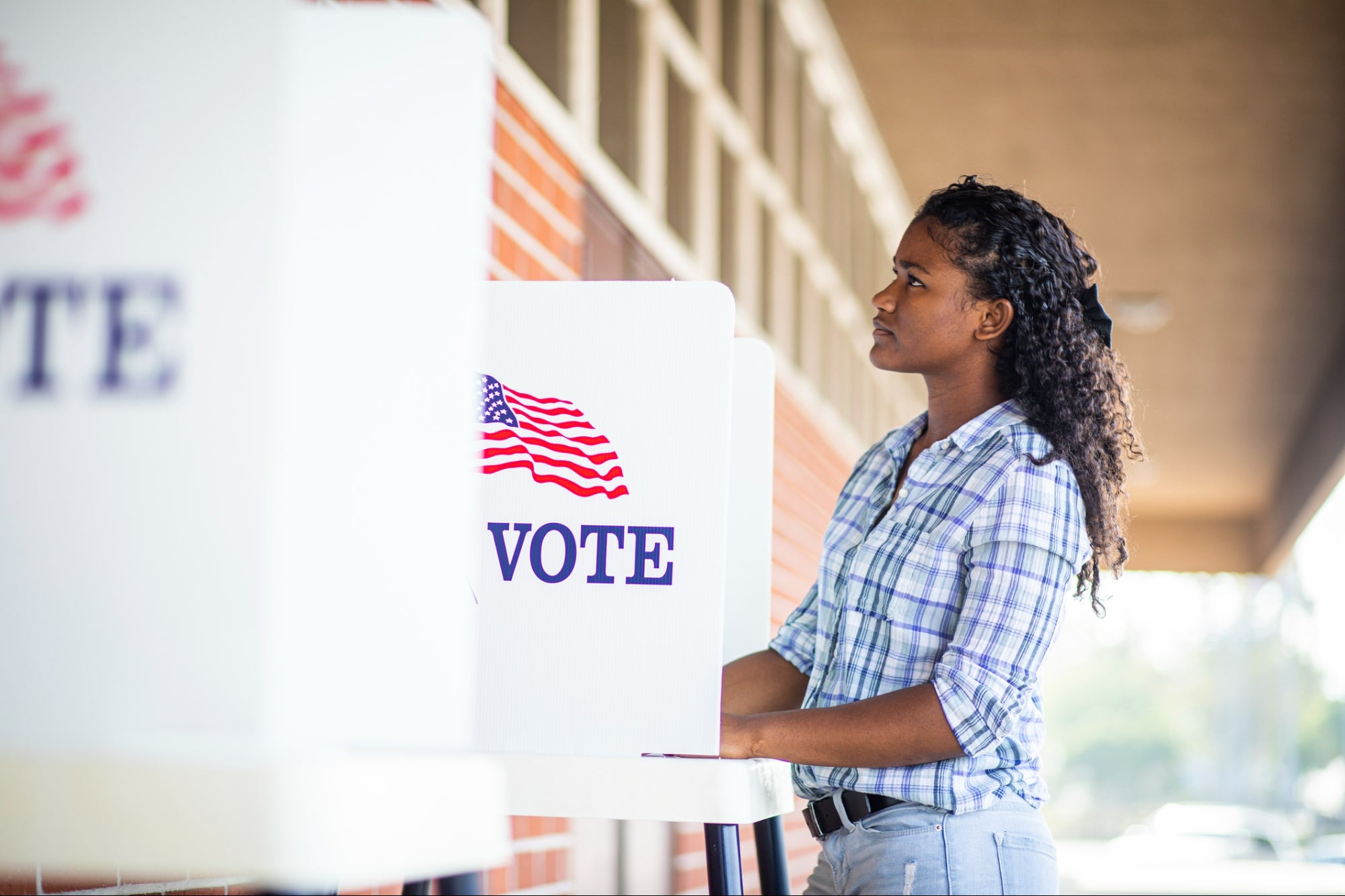If you’re feeling on edge during this election cycle, you’re far from alone.
More than 60% of survey respondents stated that their mental health has either been slightly, moderately or significantly negatively impacted by the upcoming election.
In fact, 46% reported feelings of anxiety, 37% felt stress and 31% experienced feelings of fear.
Election anxiety is impacting younger Americans in particular, the survey by Forbes Health found.
Among the generations, Gen Z (66%), millennials (64%) and Gen X (63%) were most likely to express that the election has had at least a slight negative impact on their mental health, compared to 56% of baby boomers.
Related: ‘What, Like It’s Hard?’: This Brand-Builder Uses a Marketing Secret to Increase Voter Turnout. It’s Working for 2 Million People — and Counting.
However, though the survey found the top reported emotions surrounding the 2024 election to be anxiety, stress and fear, not all reported emotions were negative. In fact, 27% of participants reported feeling optimistic, 22% felt excitement, 16% experienced happiness and 12% felt relief.
Males were more likely to express positive emotions, such as excitement (27%), than females (19%), as well as optimism (32% versus 24%). Women had a higher percentage of respondents experiencing anxiety, stress and fear.
What’s more, for some participants political stress extends beyond the voting booth and impacts school and work, according to the survey.
When asked how much their performance at work or school has been negatively affected by the upcoming election (for example, due to uncontrollable worry or anxiety), 28% of respondents stated their performance has been at least slightly affected in a negative way by the upcoming election.
Gen Z and millennials were most likely to report negative effects in their workplace or school performance, at 53% and 42%, respectively, compared to 24% of Gen X and just 10% of baby boomers.
“I think election day anxiety is a natural response to the significant decisions we are asked to make,” says Rufus Tony Spann, Ph.D., a certified school psychologist, licensed professional counselor and Forbes Health Advisory Board member based in Waldorf, Maryland.
“I believe some people’s anxiety comes from past post-election results,” Spann says. “Based on the results of previous elections, some communities felt they needed to prepare for the backlash due to the results of an election.”
Related: A Contentious Election is Coming. Here’s How to Process Your Options This Election Season
“In my opinion, anxiety can manifest in our bodies, decision-making and emotions,” Spann says. “One way to know if anxiety is manifesting in our bodies is to be aware of how our bodies react to political decision-making. Does your body become tense, and your breathing become shallow? Although these don’t have to be exact signs, they could be responses to the political situation.”
To cope with election anxiety, 44% of Americans are making efforts to avoid the news, while 35% are talking with friends and/or family. Another 29% are staying off social media, too.
In some cases, sharing political views with family or friends doesn’t always guarantee a like-minded audience, and the intensity of debates over conflicting stances has the potential to be heightened during election season.
Almost half (44%) of respondents reported feeling more anxious about spending time with family and friends for the upcoming holiday season, with the presidential election occurring just before.
At 60%, Gen Z had the highest percentage of respondents who feel at least slightly anxious about spending time with family or friends during this year’s holiday season, followed by 54% of millennials, 44% of Gen X and 28% of baby boomers.
Adding to the overwhelm and anxiety in this 2024 election cycle is the onslaught of information available on social media, survey findings suggest.
When asked which platforms overwhelm them with the volume of content they have regarding the upcoming presidential elections, respondents pointed to news publications (26%), YouTube (23%), TikTok (19%) and Instagram (16%).
Related: I’m a Small Business Owner. How Should I Vote?
However, it’s important to note that 40% of respondents stated they felt overwhelmed by none of the above.
Political content on social media sites may, in fact, be driving away users, with 26% of overall respondents reducing their social media usage ahead of the election and 6% stopping social media use entirely.
When asked whether they feel social media helps or hurts the democratic process, 40% of survey participants believe it at least somewhat harms the process, while 29% believe it at least somewhat helps it. Gen Z (45%) and millennials (36%) had the highest percentage of respondents who said that social media at least somewhat helps the democratic process. Baby boomers (51%) and Gen X (41%) were more likely to say that social media harms the democratic process, compared to 33% of millennials and 24% of Gen Z.
The intersection of social media, politics and personal relationships can also play a role in election anxiety, adds neuropsychologist Judy Ho, Ph.D. “Recognizing the triggers of election anxiety is key,” she says. “In my opinion, past elections, experiences with current political climates and messages from family, friends, media and social media can all trigger this anxiety.” She recommends coping with this anxiety by setting boundaries for the amount of time you spend consuming political news.
“Addressing election anxiety means you can actively participate in having a choice,” Spann adds. “By taking the steps to register to vote, becoming knowledgeable of the candidates and voting, you are taking an active stance in this process. This empowerment can help alleviate some of the anxiety.”
Still, if you feel overwhelmed by the election or politics, Spann notes it’s important to step away from political messaging. “After getting clarity by relaxing the mind and body, give yourself the space to make a decision you feel comfortable with. Remember, your well-being is crucial, and taking a break from stress can help you make a more informed decision,” he says.
Related: No Recession Risk Regardless of Who Wins the White House, Says Blackstone’s Steve Schwarzman

